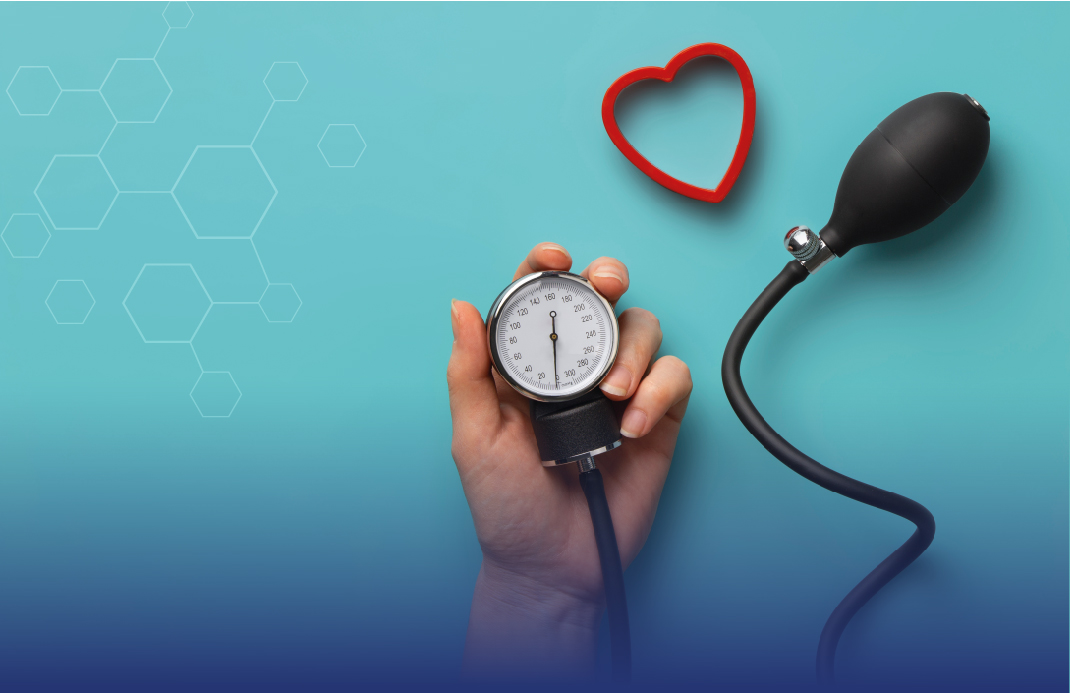High blood pressure (hypertension) is one of the most common chronic conditions in the world and one of the most silent that can be dangerous if not treated. It doesn’t always come with symptoms, but over time, it can quietly damage the heart, blood vessels, kidneys, eyes, and brain. Nearly half of the adults who have hypertension don’t realize it. Hence, dietary changes, exercise, and medicine can help you keep your blood pressure where it should be.
Key facts
According to the World Health Organization:
1.28 billion adults aged 30–79 years worldwide have hypertension. Of which, two-thirds live in low- and middle-income countries
Almost half of patients (46%) with hypertension are unaware that they have the condition.
Approximately 1 in 5 adults (21%) with hypertension have it under control.
Hypertension is a major cause of premature death worldwide.
In Saudi Arabia, an estimated 22% of adults have hypertension
What Is Hypertension?
Hypertension means your blood is pushing too hard against the walls of your arteries. This damages your arteries over time and can lead to serious complications like a heart attack and stroke.
Healthcare providers measure blood pressure in millimeters of mercury (mmHg). And it is measured in two numbers:
Systolic pressure (the top number): pressure on your artery walls when your heart contracts.
Diastolic pressure (the bottom number): pressure on your artery walls between when your heart relax between beats.
Healthcare providers measure blood pressure in millimeters of mercury (mmHg). A normal reading is typically around 120/80 mmHg.
What is considered high blood pressure?
According to the World Health Organization, Hypertension is diagnosed if, when it is measured on two different days, the systolic blood pressure readings on both days is ≥140 mmHg and/or the diastolic blood pressure readings on both days is ≥90 mmHg.
According to the American College of Cardiology and the American Heart Association, blood pressure has four general categories as follows:
Normal blood pressure. Blood pressure is lower than 120/80 mm Hg.
Elevated blood pressure. The top number ranges from 120 to 129 mm Hg and the bottom number is below, not above, 80 mm Hg.
Stage 1 hypertension. The top number ranges from 130 to 139 mm Hg or the bottom number is between 80 and 89 mm Hg.
Stage 2 hypertension. The top number is 140 mm Hg or higher or the bottom number is 90 mm Hg or higher.
Blood pressure higher than 180/120 mm Hg is considered a hypertensive emergency or crisis. Seek emergency medical help for anyone with these blood pressure numbers.
What causes hypertension?
Hypertension can be caused by a combination of lifestyle, genetics, and health conditions.
Primary (Essential) Hypertension (Most Common Type):
No single identifiable cause.
Results from a combination of factors, typically including unhealthy diet (especially high sodium), physical inactivity, and obesity.
Secondary Hypertension (Has an Identifiable Underlying Cause):
Kidney Problems: Kidney disease or conditions affecting kidney blood flow (e.g., renal artery stenosis).
Hormonal Disorders: Such as primary aldosteronism (Conn’s syndrome).
Sleep Disorders: Obstructive sleep apnea.
Medications: Certain drugs like NSAIDs (ibuprofen, naproxen), immunosuppressants, and oral contraceptives.
Recreational Drugs: Use of substances like amphetamines or cocaine.
Tobacco Use: Smoking, vaping, or using smokeless tobacco (also a modifiable risk factor).
Risk Factors for Hypertension:
Modifiable (Things You Can Change):
Diet: Unhealthy eating patterns (high salt/sodium, high saturated/trans fats, low fruit/vegetable intake).
Activity: Physical inactivity / lack of exercise.
Substances: Tobacco use (smoking, vaping, smokeless) & excessive alcohol consumption.
Weight: Being overweight or obese.
Environment: Exposure to air pollution (a significant environmental factor).
Non-Modifiable (Things You Cannot Change):
Family History: Having relatives with hypertension.
Age: Being over 65 years old.
Co-existing Conditions: Having diseases like diabetes or chronic kidney disease.
Symptoms: Why Hypertension Is Called the “Silent Killer”
Most people with hypertension feel no symptoms, even when their blood pressure is dangerously high. You can have high blood pressure for years without any symptoms.
Some may experience:
Headaches
Dizziness
Nosebleeds
Blurred vision
Shortness of breath
But these usually don’t appear until blood pressure is already at dangerous levels. That’s why regular blood pressure checks are so important.
How Is Hypertension Diagnosed?
A diagnosis is made based on multiple readings, usually taken at different times. Healthcare providers diagnose high blood pressure by measuring it with an arm cuff. If you have high blood pressure readings at two or more appointments, your provider may tell you that you have high blood pressure. Your doctor may ask you to:
Check your blood pressure at home using a monitor.
Record readings over several days or weeks.
Take part in 24-hour ambulatory blood pressure monitoring in some cases.
Platforms like Blueberry can help track your readings over time and connect you with healthcare providers for consistent follow-up, especially important if you’re managing multiple chronic conditions.
What are the complications?
Untreated hypertension may lead to serious health problems, including:
Heart Damage: Hardened arteries, angina, heart attack, heart failure, irregular heartbeat.
Stroke: Caused by burst or blocked brain arteries.
Kidney Damage: Leading to kidney failure.
Eye damage.
Other Health Problems: Serious damage to vital organs.
Prevention?
The World Health Organization recommends different lifestyle modifications that can highly reduce your risk of developing high blood pressure. These include:
Healthy Diet: More fruits/vegetables, less salt (<2g/day), avoid saturated/trans fats.
Regular Activity: ≥150 min moderate or 75 min vigorous aerobic exercise weekly.
Weight Management: Lose weight if overweight/obese.
Avoid Harmful Substances: Quit tobacco
Manage Stress & Conditions: Reduce stress, manage other medical conditions (e.g., diabetes).
Environmental: Reduce exposure to air pollution.
Monitor & Follow Medical Advice: Get regular BP checks, take prescribed medications, and keep healthcare appointments.
Treatment:
High blood pressure treatments include lifestyle changes and medications.
Lifestyle Changes:
Lifestyle changes (same as Prevention strategies) can lower blood pressure to a normal level in some cases without medication. Your doctor may recommend starting with lifestyle changes if you have elevated blood pressure or stage 1 hypertension.
Medication:
Most people need both lifestyle changes and medication. The usual blood pressure goal is 130/80 mmHg if you have heart disease, diabetes, kidney problems, or high risk. For others, the target is usually below 140/90 mmHg
Common Medication Classes:
ACE Inhibitors (e.g., lisinopril): Relax vessels, protect kidneys.
ARBs (e.g., losartan): Relax vessels, protect kidneys.
Calcium Channel Blockers (e.g., amlodipine): Relax vessels.
Diuretics (e.g., hydrochlorothiazide): Remove excess water/salt.
Routine Monitoring and Support
Keeping track of your blood pressure is key. Use a reliable home monitor, write down your results, and bring them to your checkups.
For extra support, tools like the Blueberry care platform can simplify your routine by combining monitoring, dietitian support, and doctor consultations in one place. It’s especially helpful for people managing hypertension and diabetes together.
Final Thoughts: Hypertension Is Manageable
If you’ve just been diagnosed with high blood pressure—especially if you also have diabetes—you’re not alone. Millions of people are managing hypertension successfully. With the right steps, you can protect your heart, kidneys, and overall health.
Focus on what you can control: lifestyle, medication, and consistent care. You don’t have to do it alone—platforms like Blueberry are designed to support you at every step.



